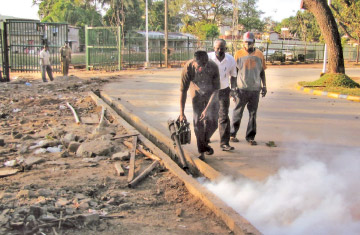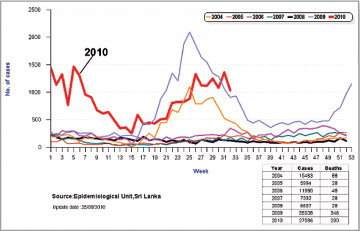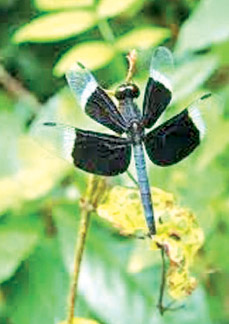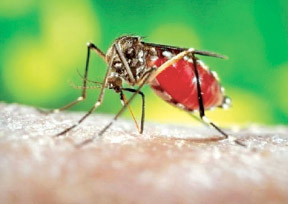|
[Sunday Observer Extra]
Dengue may raise its ugly head again:
Natural mosquito predators destroyed
By Manjula FERNANDO
|

Dr. Prasad Kariyawasam
|
Thus access roads and public services get top priority. Here, unlike
in other areas garbage visit on the dot. Any damaged public utility is
replaced pronto and security around the area is at its best.
But a night here without a mosquito net or some other sort of
mosquito repellent close at hand is a day spent in hell. The ‘soft
whisperings’ and ‘piercing kisses’ of ‘blood thirsty’ mosquitoes will
give you nothing short of a ‘memorable’ night! If this is the story of
‘affluent’ Manning Town, what will be the plight of the poorer sections
of the city?
The Sunday Observer ventured out to find the behind-the-scene story
of the CMC pest control unit.
We inquired from Dr. Prasad Kariyawasam, Chief Medical Officer of
Health of the Colombo Municipal Council why the CMC fumigation truck
this time around is making less frequent visits to housing schemes,
where mosquitoes were breeding fast, he said his team has been
overstretched.

The CMC fogging team in action |
 |
| |
| |
| |
“My department should have a cadre of 1,190. At the moment we are
running with just 640 people. According to the population of Colombo, I
should have 100 Public Health Inspectors (PHIs) but at the moment I have
only 32. I must have 55 overseers, but there are just eight. Two hundred
labourers assigned to this unit have to shoulder the workload of 325
people.
With this overstretched situation, we are doing our maximum.
Fumigation is carried out only in Colombo city. In the suburbs this is
not happening at all. The dengue control or pest control activities in
the Colombo suburbs is the responsibility of local bodies. The CMC is
limited to the Colombo city.
However, I don’t believe fumigation is the answer to controlling
mosquitoes. It is an absolute must that we keep the environment clean.
We should have a sense of responsibility towards the environment.
Why is this mosquito menace so severe in the cities and its suburbs?
In the cities, people have destroyed natural mosquito predators. You
don’t see dragonflies in the city. When we destroy natural habitats to
make way for concrete jungles, the ecological damage we cause to the
environment, help mosquitoes to breed to unimaginable proportions.
Do you see butterflies or fireflies in the cities now? This is the
problem. We just don’t care... Greenery in the city is vanishing.
If you go to the suburbs, the mosquito menace is very severe than in
the Colombo city. If you go to Kolonnawa in the night, there are sheets
of mosquitoes.
Mosquitoes are a result of ecological damage humans cause to the
environment. The influx of mosquitoes indicates that water is stagnant.
People have destroyed natural drainage systems or drainage systems have
been clogged.

Dragon fly - a natural predator |

Dengue mosquito |
The problem near the Manning town houses in Narahenpita, is that
there is a canal with polluted water in close proximity. Before the
housing complexes came up, there were individual houses in spacious and
cleaner environment, there were no mosquito problems.
A case in point is the recent outbreak of Dengue in Slave Island last
year, garbage collectors are reluctant to collect garbage because this
area is a poverty stricken area. I had to get the Police, Air Force and
the Army to come in and clean the place. This is the reason why there is
a reduction in dengue cases in Colombo City this year. When we get the
help of the forces, we get a good response from the people, but when CMC
inspectors visit, these people protest and claim that they need not give
any assistance and demand that it is the duty of the CMC to clean up the
environment.
Can we eradicate mosquitoes? This problem is not so severe in the
developing world?
No we cannot eradicate mosquitoes. There was a massive outbreak of
Dengue in Singapore about two years ago. Singapore has one of the best
anti Dengue programs there. No matter how serious the State programs are
if there is no community participation and awareness, controlling
mosquitoes in cities will always be a dream.
Even Cuba which produces the bacteria to destroy the Dengue larvae,
mosquitoes have not been eradicated. But of course they have controlled
it quite well. What they do is they send an army of people to inspect
and destroy breeding grounds. This is the most effective mechanism.
Maybe we should also adopt these tactics.
The anti Dengue campaign lacks experienced and pragmatic heads who
engage in field work., he alleged.
Every year the Health Ministry approaches the pest control unit to
carry out health projects, but we don’t get any funding from the UN or
the WHO. We have to look after our own expenses.
To the Sunday Observer’s query as to why the strong media campaign
and field work to control Dengue breeding grounds and field inspections
are on the wane lately, he said.
CMC funds are used to projects like road development and other
utility projects. What has happened is this kind of work has no calling
because the work has no visibility, hence it is not so easy to get
finances for such programs. Funding for Dengue campaigns by WHO, are
channelled directly to the health ministry and we don’t benefit by them.
In addition ‘fogging’ and other mosquito control activities go slow
this time of the year. By March and April every year, mosquitoes
disappear. When it is May, Dengue raises its ugly head. People tend to
go slow during this time. We must have a consistent program right
throughout the year if we are to effectively control this menace.
However, I am helpless as we have manpower constraints. I used to get
assistance from the NGOs and volunteer groups but it is very difficult
to sustain their enthusiasm. This is not a once and for all issue. We
have to do this every year.
Earlier we had programs with the participation of schools. But now
schools are reluctant to take part in the Dengue campaign. I spoke to a
few school principals, they were reluctant to permit children to
participate in such projects because the parents are against it.
This is a really bad situation. When we were in school, we used to
organise shramadana campaigns to clean-up and colourwash the school and
classrooms. Today parents do all this. This is all about attitude.
I can’t understand why children should not take part in anti dengue
campaigns. Children can gain a lot of knowledge on how to counter this
deadly disease, which is a major health issue in the country. Field work
will teach them how to keep their homes free of breeding grounds. This
itself is an educational exercise for students.Last year we had very
good response from schools, students as well as parents assisted us.
We cleaned up only the school premises, but this time around a
perimeter of 150 yards schools should be cleaned, because Dengue
mosquitoes can fly upto 150 yards. Despite the clean-up campaigns in
schools, last year dengue among children rose to 40% to 44%.
What I suggest is that children should move out of school with CMC
staff and try to spot breeding places in the neighbourhood. I have
written to the provincial director seeking a directive to principals but
he has not even replied to my letter to date. There is an allegation
that the authorities are being bribed by mosquito coil traders?
I don’t have any dealings with them. One company came here with a
pile of stickers carrying a Dengue warning and their trade logo. They
sought our help to paste it on every household. That was many years back
and I point blankly refused. I don’t use mosquito coils. It is an
environment pollutant and I don’t think it will do you any good.
In my house we use mosquito nets. That is the safest way to have a
good night’s sleep. The mosquito menace in the city has doubled.
Nevertheless, the anti-dengue campaign seems to have taken a back seat.
Is there a tug-of-war between the different stakeholders, we cannot
help but think. Before the deadly disease catches up again and snuffs
out innocent lives. Officials should get their act together. This is our
earnest hope. |

